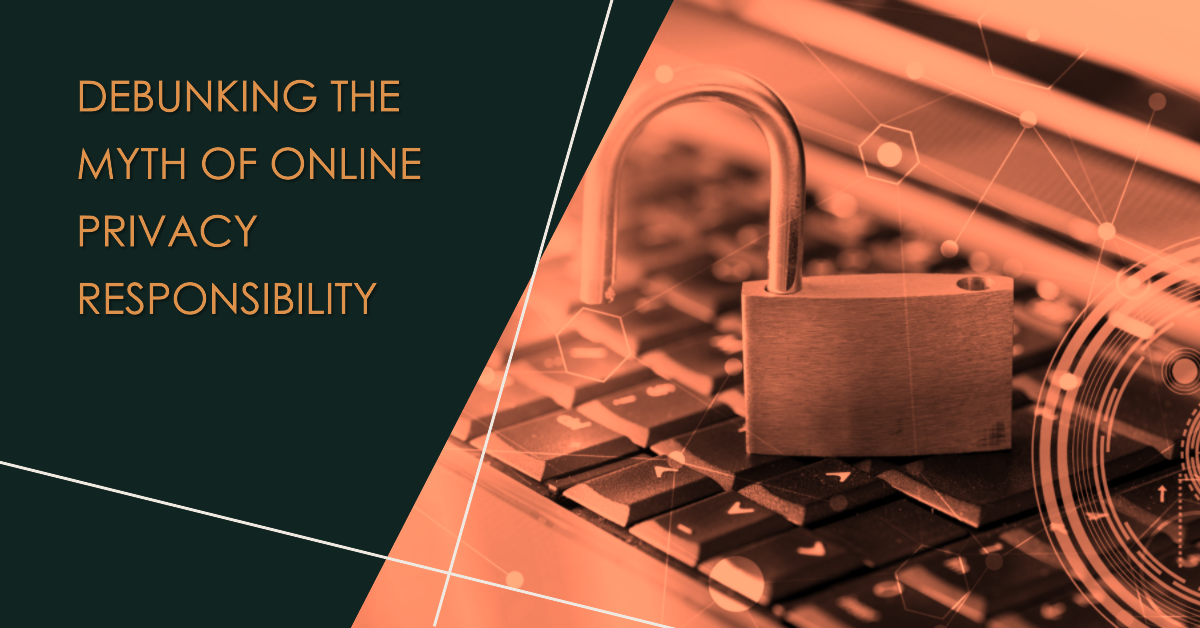Who's Really Responsible for Your Online Privacy? Debunking the Myth
In the digital age, the concept of personal responsibility for online privacy is deeply ingrained. But is it a myth? Join us as we explore the multifaceted landscape of online privacy and debunk the idea that individuals are solely responsible for their data security.

In an era where our lives are increasingly intertwined with the digital world, the question of who bears responsibility for our online privacy has never been more critical. The prevailing belief is that each of us is solely responsible for safeguarding our personal data on the internet. But is this belief grounded in reality, or is it a myth that needs debunking?
In this blog, we embark on a journey to unravel the complexities of online privacy. We'll delve into the various aspects of this subject, including data protection, cybersecurity, and the role of individuals in ensuring their online safety. By the end, we hope to shed light on the fact that online privacy is not solely an individual's burden, but rather a shared responsibility.
The Myth of Individual Responsibility
The idea that online privacy is primarily an individual's responsibility has been perpetuated for years. It's often framed as the notion that if you take proper precautions, use strong passwords, enable two-factor authentication, and avoid clicking on suspicious links, you can protect your digital life. While these practices are essential, they only scratch the surface of a much larger issue.
Understanding the Digital Landscape
To comprehend why online privacy is not solely an individual's concern, we need to grasp the vastness of the digital landscape. Our lives are increasingly lived in the digital realm, from social media interactions to online shopping and banking. Our data is scattered across countless platforms and devices, creating a complex web of information.
The Role of Tech Companies
Tech giants and companies that provide digital services play a significant role in collecting, storing, and monetizing our data. They often gather more information about us than we realize, creating a situation where our online behavior is tracked and analyzed for various purposes, including targeted advertising.
Data Breaches and Vulnerabilities
Even the most security-conscious individuals can fall victim to data breaches and vulnerabilities in online systems. Hackers continually evolve their tactics, and no system is entirely impervious to attacks. When a data breach occurs, it's not the fault of the individual who had their data stolen, but rather a systemic issue that needs addressing.
The Legal Framework
Online privacy is also influenced by the legal framework in place. Laws and regulations regarding data protection vary widely across the globe. Some regions have robust data protection laws, while others lag behind. This inconsistency puts the onus on governments and policymakers to create a secure environment for all Internet users.
The Role of Education
Education plays a pivotal role in understanding and maintaining online privacy. Many individuals lack the knowledge and awareness required to navigate the digital world safely. Therefore, it's not just about personal responsibility but also about educating users on best practices and potential threats.
The Importance of Collective Effort
Debunking the myth of individual responsibility for online privacy leads us to a crucial realization: it's a shared responsibility. Individuals, tech companies, governments, and educators all have a role to play in creating a secure online environment.
Individuals
While not solely responsible, individuals still have a vital role in protecting their online privacy. It begins with awareness, understanding the risks, and adopting best practices. This includes using strong, unique passwords, enabling two-factor authentication, being cautious about sharing personal information online, and regularly updating software and apps.
Tech Companies
Tech companies must prioritize user privacy and data protection. This involves transparent data collection practices, robust security measures, and prompt disclosure of data breaches. Companies should also give users more control over their data, including the option to opt out of data collection and targeted advertising.
Governments and Policymakers
Governments must enact and enforce comprehensive data protection laws that safeguard user privacy. They should also promote international cooperation on cybersecurity issues. Policymakers have a responsibility to ensure that technological advances align with the protection of individuals' digital rights.
Educators
Educational institutions and organizations must play a role in raising awareness about online privacy. Cybersecurity education should be integrated into curricula, and organizations should offer training to employees on how to protect sensitive data.
Conclusion
In conclusion, the myth that individuals are solely responsible for their online privacy is a dangerous oversimplification of a complex issue. While personal responsibility is essential, it is just one piece of the puzzle. Online privacy is a shared responsibility that involves individuals, tech companies, governments, and educators working together to create a safer digital world.
As we navigate the digital age, it's crucial to remember that online privacy is not a burden that rests solely on our shoulders. By acknowledging the collective effort required, we can move towards a more secure and privacy-conscious internet for all. So, the next time you hear the myth of individual responsibility, remember that we're all in this together.
ALSO READ
IoCs under the microscope: Enhancing cybersecurity through timely intelligence
Treasury Breach Sparks Major Cybersecurity Investigation
Sebi Extends Compliance Deadlines for Cybersecurity Framework
Navigating New Digital Data Protection Rules: A Landmark Draft
Government Unveils Draft Rules for Digital Data Protection: Key Insights










